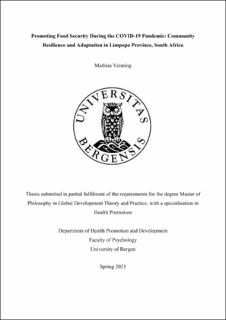| dc.description.abstract | The COVID-19 pandemic represents one of the most significant challenges to global public health in the 21st Century. The apparent socio-economic impact of COVID-19, and associated restrictions aimed at preventing transmission, has led many Health Promotion practitioners to hypothesise an emergent food crisis within low-income communities - deemed vulnerable to exogenous shocks. Yet communities are not homogenous; vulnerability is a spectrum mitigated by the availability of community-level resources, or protective factors. As such, this study adopts the theoretical approach of Community Resilience to explore the dynamic socio-ecological phenomenon of COVID-19 related food insecurity across low-income rural communities in Limpopo Province, South Africa. Food insecurity is conceptually derived from the FAO’s ‘Four Pillars’ definition of food security. Key objectives were to: (1) Explore current stressors of COVID-19 related food insecurity; (2) Explore the existence of community-level protective factors that maintain food security within Limpopo Province. This study followed a qualitative phenomenological approach. Semi-structured interviews were conducted with nine rural community members in Mopani District (Limpopo) and relevant members of Civil Society Organisations (CSOs). This study found that despite Limpopo being historically one of the most food-secure provinces in South Africa, COVID-19 has undermined local food systems and exacerbated existing vulnerabilities causing food insecurity. Traditional coping strategies have been limited by COVID-19 restrictions but informal sector activity, natural capital, social capital and community competencies were found to act as important community-level protective factors that promoted food security. However, low economic development caused by historical racial inequality has bred resource inequities that fundamentally eroded resilience capacity. Although many protective factors exist that could and should be promoted within Health Promotion interventions are identified, the wider developmental pursuit of eradicating poverty remains key. | |
